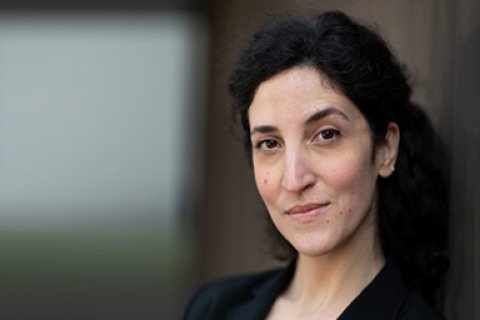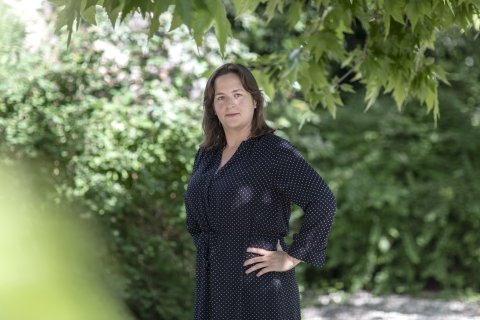Six Utrechts researchers receive NWO funding
60 projects awarded Open Competition SSH XS funding

Lorena De Vita, Merel van Goch, Ruud Hortensius, Verena Seibel, Friedemann Polzin and Iryna Susha are awarded Dutch Research Council (NWO) Open Competition SSH XS funding. The grant of up to EUR 50,000 offers researchers the chance to launch a promising idea or innovative initiative. A total of 60 research projects will receive funding from the pilot programme.
Projects and laureates
Project: Wording Repair: Digitally Unveiling the History of Reparative Justice in the Words of a Forgotten Diary
This Open Competition grant will allow me and my team to conduct ground-breaking research.

Reparations in the Words of a Forgotten Diary
German jurist Otto Küster (1907-1989) dedicated much of his professional life to the quest for reparations for Holocaust survivors. He did so while taking notes in personal diaries, on an almost daily basis, which have never been made available to researchers until now.
This project will investigate the history of reparation in the aftermath of mass human rights abuse, by employing digital tools. While using and advancing handwritten-character recognition (HCR) technology, Wording Repair will provide bottom-up insights that will contribute to shaping the emerging field of historical reparations studies.
“This Open Competition grant will allow me and my team to conduct ground-breaking research,” De Vita reacts. “We will work towards integrating deeply personal histories with those about institutions and practices of repair in the wake of gross human rights abuse, tracing the history of one of the most delicate and complex topics that characterised the course of the twentieth century.”
Project: Once Upon a Time in Academia: How Campus Novels Can Improve PhD Candidates’ Well-being
What is the Impact of Campus Novels on PhD Candidates’ Well-being?

The Impact of Campus Novels on PhD Candidates’ Well-being
The well-being of PhD candidates is under pressure and many experience imposter feelings. Reading for pleasure increases people’s well-being: stories, and especially humour in stories, can help people by creating reflective distance from reality.
In her research, Van Goch hypothesises that campus novels – novels set on college campuses, told from the perspectives of faculty or students – are particularly effective, because they are characterised by dark humour and satire. She has groups of PhD candidates reflect on campus novel texts together, and study the interaction between texts and readers, and the effects of group reflection on well-being.
“This project differs from other suggestions to relieving PhD candidates’ imposter feelings in that it is an evidence-based, non-academic leisure activity as a means to improve their situation,” Van Goch says. “With this grant we can contribute to a growing field of research, as studies on the positive impact of shared reading on mental well-being is steadily accumulating, but is still in an exploratory stage.”
Project: A group-centred mobile lab to study the impact of artificial intelligence on family social dynamics
The question is how to describe family dynamics in this era of artificial intelligence.

Virtual assistants
Hortensius states in his project that virtual assistants are increasingly part of families: "The question is how we can describe family dynamics in this era of artificial intelligence." With his project, the Utrecht scientist wants to develop a new group-oriented mobile lab to understand the influence of interactions with virtual assistants on the social dynamics of families. "By using an innovative neurocognition-in-the-home approach, we can take both behavioural and brain measurements of all family members. In this way, we map out the social dynamics in great detail."
Project: Why do contacts with natives increase migrants’ chances on the labor market? The role of system knowledge
It is assumed that native Dutch people transfer systemic knowledge about the Dutch labour market to people with a migration background.

Chances of migrants on the Dutch labour market
Seibel notes in her research project that people with a migration background are still underrepresented on the Dutch labour market, compared to native Dutch people. According to the researcher, this is much less true for migrants who maintain social relations with native Dutch people. Seibel: "The literature assumes that native Dutch people transfer systemic knowledge about the Dutch labour market to people with a migration background, which is crucial for their job search. However, this assumption has never been empirically tested.”The Utrecht scientist wants to investigate with her project why contacts with native Dutch people do indeed increase migrants' knowledge about the Dutch labour market, and thus positively influence the chances of migrants on the labour market.
Project: The new reality of double materiality – towards an integrated perspective on financial and societal value creation in firms
I am very happy that NWO has awarded funding to my research proposal for this relevant topic.

Given the urgency of the climate crisis and other societal challenges, calls for businesses to engage with those challenges have grown substantially over recent years. But which topics should businesses prioritize? Until now these have been limited to issues that can be easily measured and reported and that pose an immediate risk to the company. This research project will use a novel dataset which includes the ‘objectified’ societal footprint of companies (including the impact they have on society). It will allow to make a significant step towards a holistic link between financial and societal value creation in firms.
Friedemann Polzin about the awarded funding
I am very happy that NWO has awarded funding to my research proposal for this relevant topic. Given the fact that we have little time left to steer our economy and business on a sustainable path, new measurement tools, which may lead to greater behavioral changes, are urgently needed. I hope to contribute to this trajectory with my project. The research also ties in with recent developments in the field of regulation and transparency of corporate performance.
Project: Data purchasing by governments in the context of societal challenges: A mapping study
Governments increasingly resort to purchasing data from the private sector and this poses several challenges.
This project is the first systematic effort to create an evidence base about when, how, and for what purposes Dutch (local) authorities resort to purchasing data from the private sector and what might be the (adverse) effects of that. In this project Susha (Faculty of Geosciences) will collaborate with Utrecht University’s Data School. The Data School is a teaching and research platform at Utrecht University. Affiliated scholars actively shape the digital society and study how citizenship and democracy are changing through datafication and algorithmisation.

